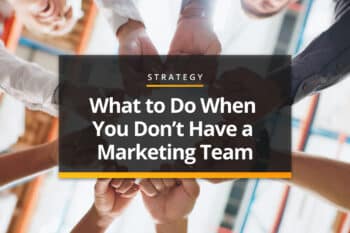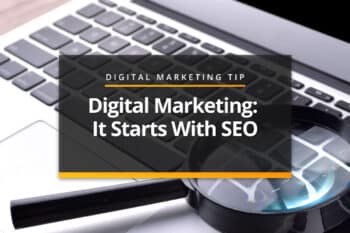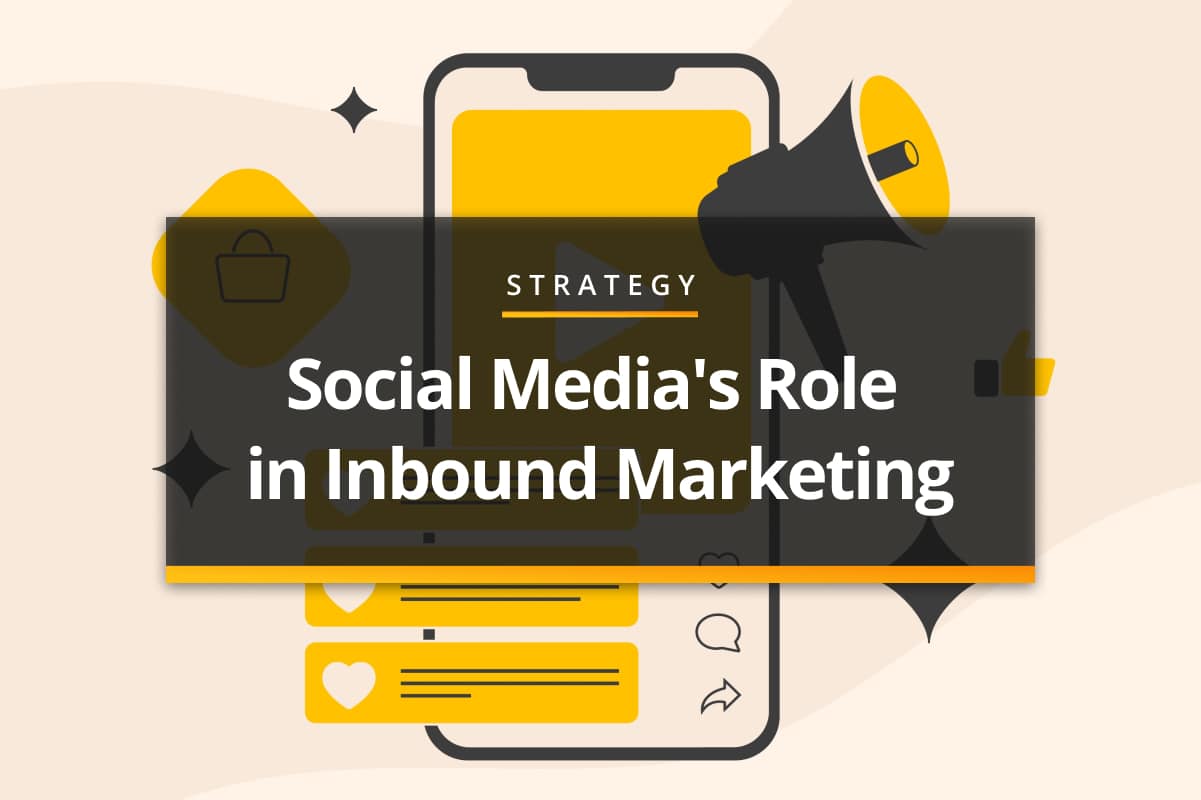
The Role of Social Media in an Inbound Marketing Strategy
Social media began as a tool to connect people and share information and has evolved into a vital marketing tool. Its ability to connect businesses with their target audience along various stages of the flywheel model makes social media an invaluable tool for companies to integrate into their inbound marketing strategy. Let’s take a look at the benefits social media offers businesses.
1. Attracting Prospects with Engaging Content
At the heart of inbound marketing is the creation of valuable content that attracts potential customers. Social media gives businesses the opportunity to attract new customers through content while creating brand awareness.

- Brand Awareness: Social media has the opportunity to gain attention of prospective leads that may not have engaged with the business from other resources. Businesses can use the platforms to share the company story, goals, and mission, giving potential customers a better way to learn about the company and the products or services it provides.
- Content Distribution: Social media can help drive the exposure of blog posts, infographics, videos, and other forms of content, which ultimately lead the customer to the website. Utilizing different platforms, such as Meta, Linked-In, Ticktock, and others, can amplify the reach and engage users who are on different platforms.
- Audience Targeting: Social media platforms allow companies to target audiences based on user interests, demographics, and behavior. By tailoring the content to resonate with specific segments of the audience, it can attract users who are more likely to engage with the brand.
2. Building and Nurturing Relationships
Social media platforms allow customers to interact directly with their audience. Building and nurturing relationships with customers is essential for businesses to have an effective marketing strategy.
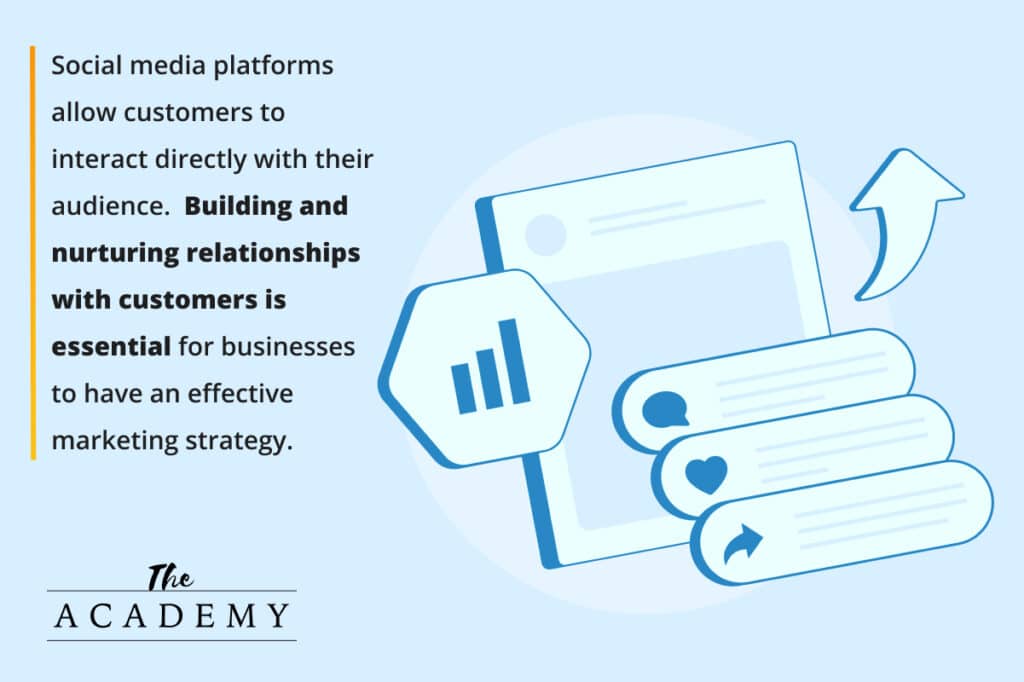
- Engagement and Interactions: Responding to comments, answering questions, and participating in discussions can build trust while also providing valuable feedback on understanding customers’ needs and for generating ideas for new products or services.
- Personalization: By observing customers threads, a business can optimize on the information to create personalized content and interactions that will better resonate with the audience.
3. Establishing Authority and Credibility
Establishing a brand as an authority in its industry is a key component of inbound marketing. Social media helps reinforce a company’s credibility and expertise.
- Sharing Expertise: Posting thought leadership content, industry news, and expert insights on social media positions a brand as a knowledgeable leader. Regularly sharing valuable information helps build a positive reputation and fosters trust with the audience.
- Showcasing Success Stories: Highlighting case studies, testimonials, and customer success stories on social media can validate expertise and demonstrate the value of products or services.
- Addressing Criticism: While success stories are important to showcase, so is the ability to handle negative feedback. Responding to negative feedback in a positive manner shows that a company is committed to its customers and the product or service it offers. Criticism also gives businesses an opportunity to learn from an unsatisfied customer and determine if opportunities exist to increase overall customer satisfaction.
4. Generating and Qualifying Leads
Social media is not just a tool for brand awareness; it can also be instrumental in generating and qualifying leads.
- Lead Magnets: Social media platforms are an excellent way for companies to promote lead magnets such as eBooks, whitepapers, and webinars to which users exchange their contact information for these valuable resources.
- Lead Generation Forms: Platforms like Facebook and LinkedIn offer lead generation forms that allow users to submit their information directly to the company without leaving the platform, simplifying the process and increasing lead volume.
- Promotions: Whether a company is promoting content, products, or offers- social media is a great way to get the information out to many different audiences.
5. Driving Conversions and Measuring Success
Ultimately, the goal of inbound marketing is to drive conversions. Social media contributes to this objective by supporting various conversion strategies and providing valuable metrics.
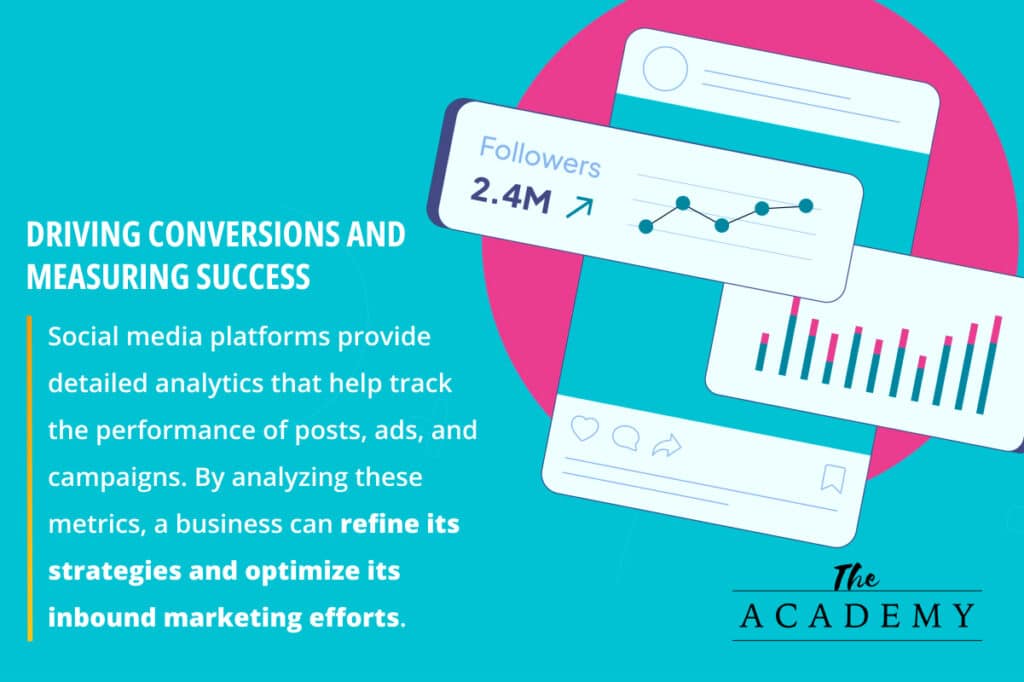
- Call-to-Action (CTA): Social media posts can direct users to landing pages, product pages, or special offers. Once onsite, the user can learn more about the company, product, or service and effectively convert through the CTA on the page. Or, as mentioned above, can allow a user to fill out a form without having to leave the platform.
- Analytics and Insights: Social media platforms provide detailed analytics that help track the performance of posts, ads, and campaigns. By analyzing these metrics, a business can refine its strategies and optimize its inbound marketing efforts.
- Link Building: Link building is an essential component of SEO. According to Semrush, one of the best ways to acquire links is to build brand awareness, which, as discussed in the first section, can be effectively done through social media.
Conclusion
Social media has become a staple of inbound marketing; according to Forbes, 77% of businesses are using social media to reach customers. With the ability to attract new customers, engage and nurture current customers, and drive conversions, social media proves to be an effective way to improve inbound marketing strategies.
Most Popular Articles

Seeing Favicons in Your Google Search Results? Here’s Why…
Have you noticed anything different in your Google Search results lately? Google added tiny favicon icons to its organic search results in January. It was…

Business Growth and Digital Marketing News & Tips 11-17-24
Are you encouraging and rewarding innovation? Lee Cockerell is the former Executive Vice President of Operations at Walt Disney World. A lover of traditional red…

Business Growth and Digital Marketing News & Tips 11-27-24
A culture of gratitude "Feeling gratitude and not expressing it is like wrapping a present and not giving it." – William Arthur Ward Beyond being…


